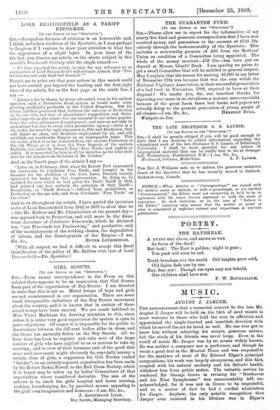LORD BEACONSFIELD AS A TARIFF REFORMER.
{TO THE EDITOR OP TEE " SPECTATOR." j
SIR,—Scrupulous fairness of criticism is an honourable and, I think, unbroken tradition of the Spectator, so I may perhaps be forgiven if I venture to draw your attention to what has the appearance of a slight lapse. In your issue of the 4th inst. you dismiss my article on the above subject in this month's Nineteenth Century with the single remark:- " We have searched the article in vain for any reference to or explanation of Lord Beacon...field's unfortunate remark that 'Pro- tection was not only dead but damned.' " Permit me to point out that your ardour in this search could not have carried you beyond the heading and the first eight lines of the article, for on the first page, at the ninth line, I say:- "Always a foe to shams, he never advocated, even in his earliest speeches, such a Protective fiscal system as would make corn- growing artificially profitable in the United Kingdom. But his robust intellect perceived that between the extreme of Protection on the one side, and that of unrestricted competition and State- aided imports on the other—the one harmful to our urban popula- tions, the other subversive of employment, and ruinous not only to agriculture but also to every other productive agency—there is a Ma media, favoured by such statesmen as Pitt and Hnskisson, that will injure no class, will facilitate employment for all, and will establish our world-wide Empire on an impregnable basis. This via media, which is as far removed from the ancient Protection of the old Whigs as it is from the Free Imports of the modern Radicals, was called by Disraeli Tory 'Free Trade,' and rightly so called. It is presented by him in all his speeches as the true anti- dote for the mischievous doctrines of Mr. Cobden."
And on the fourth page of the article I say:- " Later on, in February, 1846, when Sir Robert Peel announced his conversion to Cobdenite Free Trade, and brought in his measure for the abolition of the Corn Laws, Disraeli warmly upbraided his leader for this tergiversation. In doing so, he justified the vote which he had given for Peel's Tariff in 1842, and pointed out how entirely the principle of that Tariff— Reciprocity, or Tariff Reform '—differed from prohibition or Protection on the one side, and from Cobdenite 'Free Trade' on the other."
And so on throughout the article. I have quoted the ipsissima verba of Lord Beaconsfield from 1842 to 1879 to show that he —like Mr. Balfour and Mr. Chamberlain at the present day—
was opposed both to Protection, and still more to the disas- trous doctrines of Cobdenite Free-trade, which he declared was "not Free-trade but Freebooting," and productive only of the unemployment of the working classes, the degradation of labour, and the disintegration of the Empire.—I am,
[With all respect, we find it difficult to accept this fiscal identification of the policy of Mr. Balfour with that of Lord Bea co nsfield.—En. Spectator.'


































 Previous page
Previous page